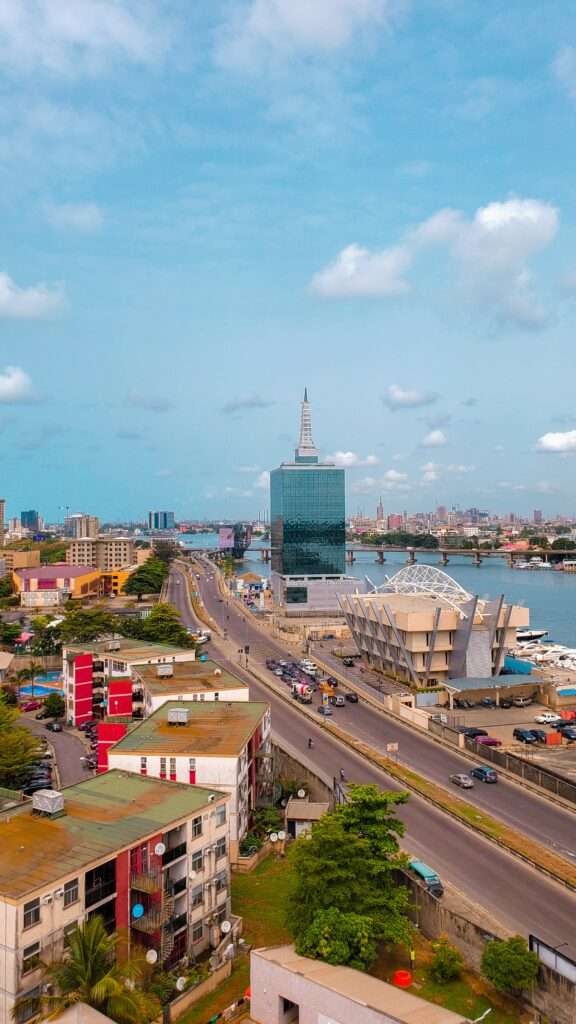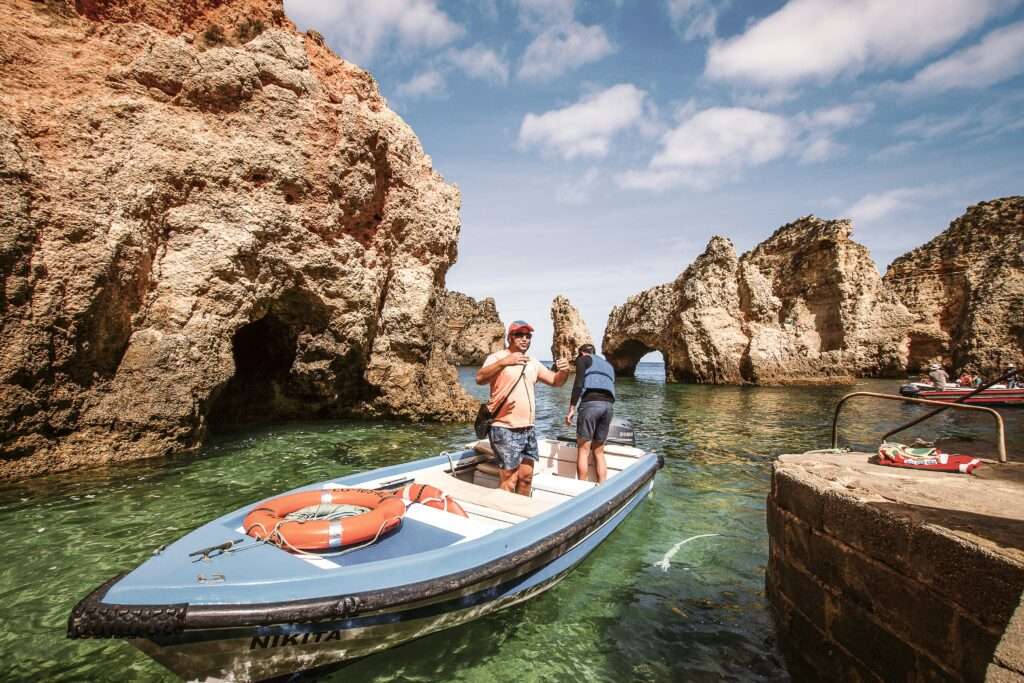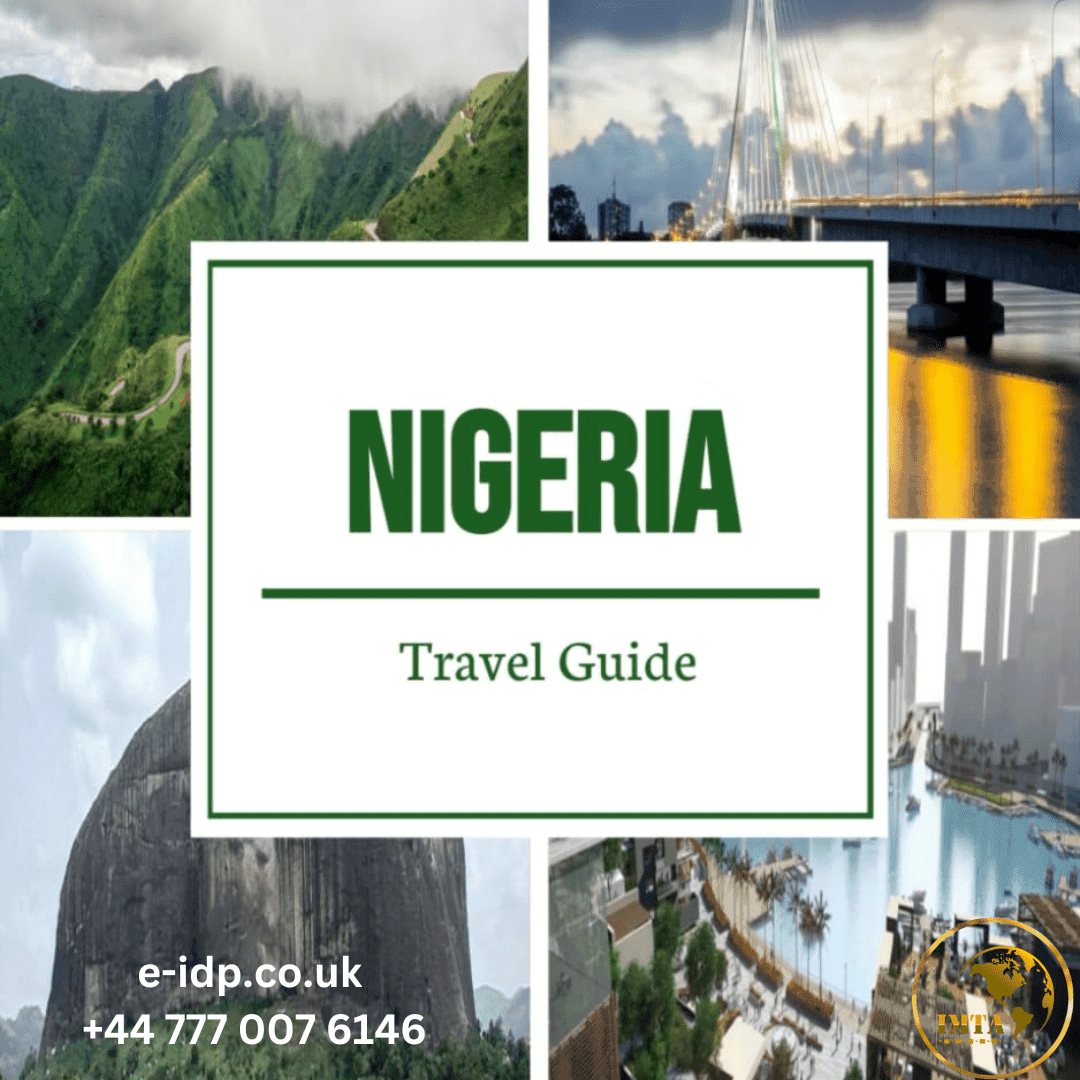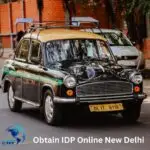Nigeria driving guide online, IDP apply online Nigeria, International Driving Permit Nigeria, International Driving licence Nigeria, International Driving license Nigeria 
Nigeria, situated in West Africa, stands as the most populous country on the continent, boasting a rich tapestry of diverse cultures, historical sites, bustling urban centres, and breathtaking natural beauty. Recognized for its vibrant cities such as Lagos and Abuja, deep-rooted heritage, and stunning national parks, Nigeria proves to be an exhilarating destination for travellers seeking a wide range of experiences.
Best Time to Visit
– November to February (Dry Season): This period is the ideal time to visit Nigeria due to cooler and less humid weather, facilitating easier travel throughout the country.
– March to October (Wet Season): Nigeria experiences heavy rainfall during this time, especially from June to September. Although certain regions remain accessible, travel conditions, particularly in rural areas, may pose more challenges.
 Top Destinations
Top Destinations
Lagos
– Description: As Nigeria’s largest city and financial centre, Lagos is renowned for its dynamic atmosphere, beaches, markets, and lively nightlife.
– Highlights:
– Lekki Conservation Centre: A nature reserve featuring a canopy walkway and indigenous wildlife.
– Victoria Island: Famed for its upscale hotels, restaurants, and beaches.
– Nike Art Gallery: One of Africa’s largest art galleries, showcasing Nigerian art.
– Tarkwa Bay Beach: A tranquil beach perfect for relaxation and water sports.
Abuja
– Description: Serving as Nigeria’s capital city, Abuja is distinguished by its modern architecture and political significance.
– Highlights:
– Aso Rock: A prominent rock formation dominating the city skyline, providing hiking opportunities.
– National Mosque: A remarkable piece of architecture welcoming visitors.
– Zuma Rock: A monolithic rock on the outskirts of Abuja, often referred to as the “Gateway to Abuja.”
Yankari National Park
– Description: Positioned in Bauchi State, Yankari National Park stands as one of Nigeria’s premier national parks and a haven for wildlife.
– Highlights:
– Wildlife Safaris: Offer opportunities to spot elephants, lions, baboons, and buffaloes.
– Wikki Warm Springs: A natural warm spring where visitors can swim.
– Game Drives: Guided tours offer the best wildlife experience within the park.
Calabar
– Description: Located in southern Nigeria, Calabar is a historic city celebrated for its colonial history and cultural festivals.
– Highlights:
– Tinapa Resort: A sprawling leisure and entertainment centre offering shopping, water parks, and more.
– Calabar Museum: Showcasing the city’s role in the transatlantic slave trade and its rich cultural history.
– Obudu Mountain Resort: A scenic resort in the highlands offering hiking, canopy walkways, and cool mountain air.
Benin City
– Description: Serving as the heart of the ancient Benin Kingdom, this city is renowned for its art and history.
– Highlights:
– Benin Bronzes: Acclaimed bronze sculptures depicting the history and culture of the Benin Kingdom.
– Benin National Museum: Home to an extensive collection of artifacts, including the renowned bronzes and ivory works.
Exploring Nigeria:
- Dive into Cultural Experiences
– Treat your taste buds to traditional Nigerian cuisine such as Jollof Rice, Pounded Yam with Egusi Soup, Suya (spiced grilled meat), and Pepper Soup. Don’t miss the vibrant food scenes in Lagos and Abuja, which boast both local and international restaurants.
– Immerse yourself in Nigerian festivals:
– Lagos Carnival: An annual explosion of colour, music, and dance that’s not to be missed.
– Calabar Carnival: Celebrated in December, it’s one of Africa’s grandest street carnivals, filled with parades, cultural performances, and music.
– Osun-Osogbo Festival: Recognized by UNESCO, this traditional festival honours the goddess Osun and takes place in the sacred Osun-Osogbo Forest.

- Handy Travel Tips
– Visa Requirements: Most travellers will need a visa to enter Nigeria, which can be obtained in advance from a Nigerian embassy or consulate. Some countries may be eligible for a visa on arrival or an e-visa.
– Currency: Nigerian Naira (NGN) is the official currency. While credit cards are accepted in major cities, it’s wise to carry cash for smaller towns and markets.
– Language: English is the official language, but Nigeria is a multilingual country with over 500 local languages. Yoruba, Hausa, and Igbo are among the most widely spoken.
– Health & Safety:
– Vaccinations: A yellow fever vaccination is required for entry. Malaria is a risk, so ensure you take anti-malaria medication and use insect repellent.
– Safety: Exercise caution, especially in crowded areas, and avoid traveling to regions with ongoing security concerns, such as the northeast due to Boko Haram activity. Stay updated on local news and government travel advisories.
- Getting Around
– Flights: Murtala Muhammed International Airport (LOS) in Lagos and Nnamdi Azikiwe International Airport (ABV) in Abuja are Nigeria’s major international airports. Domestic flights connect major cities.
– Road Travel: Nigeria’s road network can be challenging, with traffic congestion, especially in Lagos. Car hire services are available, but it’s advisable to hire a driver or use reputable taxi services.
– Public Transport: Buses and minibuses are part of the public transportation system, but they can be crowded. Ride-hailing apps like Uber and Bolt operate in major cities like Lagos and Abuja, providing a more convenient and safer option for getting around.
- Places to Stay
– Luxury Hotels: International chains like Hilton, Radisson Blu, and Marriott provide high-end hotel options, particularly in Lagos and Abuja.
– Mid-Range Hotels: Many cities offer mid-range hotels and guesthouses that provide comfortable and affordable accommodations.
– Budget Options: Hostels, budget hotels, and guesthouses are available in most urban areas, offering a more affordable stay for travellers on a budget.
– Eco-Lodges and Resorts: For a nature-focused experience, consider places like Obudu Mountain Resort and Yankari National Park, which offer accommodation options in scenic environments.
- Explore Nigeria’s Wildlife and Nature
– Wildlife Reserves: If you’re a wildlife enthusiast, don’t miss the opportunity to visit Cross River National Park, home to chimpanzees, gorillas, and rare birds, in addition to the well-known Yankari National Park.
– Beaches: Experience the beauty of Nigeria’s southern coastline at popular relaxation spots such as Lekki Beach, Tarkwa Bay, and Eleko Beach near Lagos, perfect for water activities and unwinding.
– Hiking and Nature: Venture to the Mambilla Plateau in Taraba State for breathtaking mountain scenery, waterfalls, and excellent hiking opportunities.
- Essential Details
– Electricity: Nigeria uses a 230V supply, with type D and G plugs (same as the UK). Note that power outages can be common, so many accommodations have generators.
– Time Zone: Nigeria operates on West Africa Time (WAT), which is UTC +1.
– Emergency Numbers:
– Police: 112 or 199
– Ambulance: 112
– Fire: 112
- Recommended Itinerary
– Day 1-2: Lagos – Immerse yourself in the vibrant city, visit the Nike Art Gallery, relax on Lekki Beach, and experience the bustling Lagos nightlife.
– Day 3-4: Abuja – Explore Aso Rock, the National Mosque, and take a day trip to Zuma Rock.
– Day 5-7: Yankari National Park – Delight in a safari, discover Wikki Warm Springs, and explore the diverse wildlife.
– Day 8-9: Calabar – Engage with the history at Calabar Museum and soak in the scenic beauty of Obudu Mountain Resort.
- Final Thoughts
Nigeria promises a multifaceted travel experience, from its vibrant urban centres to its rich cultural heritage and wildlife excursions. Whether it’s the energetic streets of Lagos, the highlands of Obudu, or the cultural fiestas in Calabar, Nigeria offers a diverse and profound experience for every traveller.
What you need to rent a car, and how to rent one
As a tourist, you’ll most likely be renting a car (more on that in a bit) for your road trip. Even so, there are certain requirements that you’ll have to check off before you get into it.
- You have to get an International Driver’s Permit. Apply for it online or head to the office — we prefer doing it in person because the queue is pretty short during off-peak hours, and you can get it done on the same day. It’ll cost S$20 and is valid for one year from the date of issue.
- A valid local driver’s license. international driving licence online
- You have to be at least 21 years of age and have held your local licence for a year. A surcharge may be imposed for drivers under the age of 25.
- A passport for identification .
- A credit card in the driver’s name.
How to obtain an international driving permit

The process of obtaining an international driving license directly from an office can be quite challenging and time-consuming. The payment methods involved can also be complex. Therefore, it is recommended to consider applying for an international driving license from IMTA. The application process only takes around 10 to 15 minutes, making it a more efficient option for getting your international driving permit Get Your Online Int’l Driving Permit for the United Kingdom
The necessary details required for the application of an International driving permit include:
– Full Name
– Email & Phone Number
– Current Address
– Place of Birth
– National Driver’s License Number
– National Driver’s License Issued Date & Expiry Date
– Picture of Driver’s License & Your Head Shot Photo for Your IDP
Nigeria driving guide online, IDP apply online Nigeria, International Driving Permit Nigeria, International Driving licence Nigeria, International Driving license Nigeria, Nigeria driving guide online, IDP apply online Nigeria, International Driving Permit Nigeria, International Driving licence Nigeria, International Driving license Nigeria, Nigeria driving guide online, IDP apply online Nigeria, International Driving Permit Nigeria, International Driving licence Nigeria, International Driving license Nigeria






